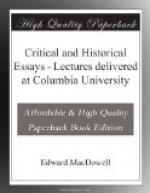It is reasonably certain that the seemingly incongruous titles to the Psalms were merely given to denote the tune to which they were to be sung, just as in our modern hymns we use the words Canterbury, Old Hundredth, China, etc.
The word selah has never been satisfactorily explained, some readings giving as its meaning “forever,” “hallelujah,” etc., while others say that it means repeat, an inflection of the voice, a modulation to another key, an instrumental interlude, a rest, and so on without end.
Of one thing we may be certain regarding the ancient Hebrews, namely, that their religion brought something into the world that can never again be lost. It fostered idealism, and gave mankind something pure and noble to live for, a religion over which Christianity shed the sunshine of divine mercy and hope. That the change which was to be wrought in life was sharply defined may be seen by comparing the great songs of the different nations. For up to that time a song of praise meant praise of a King. He was the sun that warmed men’s hearts, the being from whom all wisdom came, and to whom men looked for mercy. If we compare the Egyptian hymns with those of the Hebrews, the difference is very striking. On the walls of the great temples of Luxor and the Ramesseum at Thebes, as well as on the wall of the temple of Abydos and in the main hall of the great rock-hewn temple of Abu-Simbel, in Nubia, is carved the “Epic of Pentaur,” the royal Egyptian scribe of Rameses II:
My king, his arms are mighty, his heart is firm. He bends his bow and none can resist him. Mightier than a hundred thousand men he marches forward. His counsel is wise and when he wears the royal crown, Alef, and declares his will, he is the protector of his people. His heart is like a mountain of iron. Such is King Rameses.
If we turn to the Hebrew prophets, this is their song:
The mountains melted from before the Lord and before Him went the pestilence; burning coals went forth at His feet. Hell is naked before Him and destruction hath no covering. He hangeth the earth upon nothing and the pillars of heaven tremble and are astonished at His reproof. Though He slay me, yet will I trust in Him. For I know that my Redeemer liveth, and at the last day He shall stand upon the earth.
As with the Hebrews, music among the Hindus was closely bound to religion. When, 3000 years before the Christian era, that wonderful, tall, white Aryan race of men descended upon India from the north, its poets already sang of the gods, and the Aryan gods were of a different order from those known to that part of the world; for they were beautiful in shape, and friendly to man, in great contrast to the gods of the Davidians, the pre-Aryan race and stock of the Deccan. These songs formed the Rig-Veda, and are the nucleus from which all Hindu religion and art emanate.




